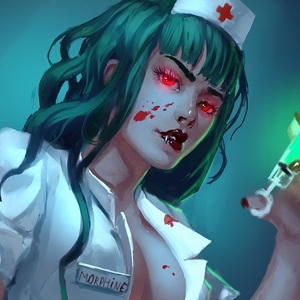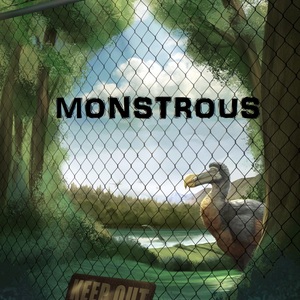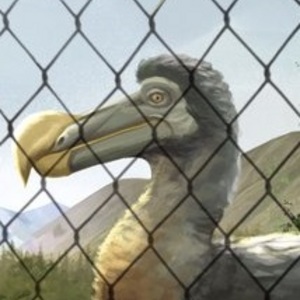It was a great relief to him when Mr. Rutherford popped up out of the cockpit, having presumably had the good sense to duck down inside during the final moments of their descent. “Ma heid’s mince,” he muttered. Then he seemed to remember where he was. “Apologies, sir. I may have suffered a concussion, but I’m sure I can muddle through.”
Baird nodded uneasily. He looked around and saw they were miles from shore. He could just make out some mountains on the horizon. The storm, at least, seemed to have passed over them and moved on. While his cockpit was ankle deep in cold water, the sky was all but clear.
Turning about to look out at sea, he noticed something interesting. There was an island well within reach—perhaps four hundred yards away. No more than a rocky crag sticking up above the waves, but it was something.
“It looks like some manner of seamount, sir,” Mr. Rutherford said.
“Yes, yes it does,” Baird said, smoothing down his mustache with one hand. “And what do you see at its pinnacle? Is that what I imagine it to be?”
Even at this distance it was clear. The little mountain bore, at its very top, a nest. A bird’s nest. A bird’s nest large enough that they might have landed the plane inside it, if they hadn’t come down in the water first.
“It would appear,” Baird said, his accustomed brio returning to his voice, “that not all is lost.”
“Very good, sir,” Mr. Rutherford said. “I’ll break out our mountaineering gear.”
The plane might lack wings but its engine still worked. Baird had to get out and turn the propeller with his hands, while standing precariously atop one of the floats, but soon the pistons sputtered to life and they were able to taxi across the short distance to the rocky island.
Together they clambered out and laid boots on a piece of land that—perhaps—no other human being had touched since it rose from the waves. Admittedly, it wasn’t much of a find. A few shellfish serrated the shore, and bits of kelp and seaweed adorned the lower rocks, but above that it was a near vertical slope of barren rock. Streaked here and there with whitish stains.
“Er, have a care, here,” Baird said, indicating the discolorations. “I have a feeling that’s guano. Best not to touch it without gloves.”
“I have prepared for this very eventuality, sir,” Mr. Rutherford said, and produced two pairs of very sturdy climbers’ gloves.
Of the ascent, there is not much to say. On one occasion what Baird thought was a sturdy handhold turned out to be a loose rock, and he nearly fell to his death. He was saved by a stout rope tied around Mr. Rutherford’s waist. On another occasion they were forced to “chimney” up forty feet of jagged rock that tore their heavy coats and bruised the flesh beneath. Otherwise it was a perfectly simple and ordinary climb, of the kind Baird and Rutherford had made countless times on the bens and braes of their highland home. They were far better climbers than aviators, and they had little trouble reaching the peak. This proved to be a relatively flat bit of land, almost like a mesa, which was just a little wider than necessary to accommodate the nest.
The nest itself was a wonder. It was a full fifty feet across, a shallow bowl made of woven together detritus. Where a swallow or an owl’s nest might be made of straw and twigs, this one, however, was made mostly of entire tree branches and a few broad trunks, twisted together in an amazing fashion. Here and there Baird spotted even more exotic building materials—what appeared to him to be the masts of lost ships, and stretches of canvas from their sails. He thought he might have even seen the fabric roof of an automobile in there, perhaps a Model A or a Pierce Arrow Coupe, though it was so twisted up and weathered he couldn’t be sure. The floor of the nest was littered with the skeletons of giant fish, of seals and walruses with great long tusks, and even a couple of what had to be narwhal horns. Remains of past dinners, certainly.
The nest contained a treasure greater than ivory, though.
He had been fretting, as much as Baird ever gave in to uncertainty, about how, having found the thunderbird, they were likely to get it home. They could sedate the creature for the journey but it was large enough that he couldn’t see them lashing it to the fuselage of the airplane, even back when that vehicle was airworthy. He had considered the logistical difficulty of getting a ship out here with a crew brave enough to carry such frightening cargo.
Now he had his answer, and no prospector in the gold fields of the Yukon had ever struck such a rich claim, he thought.
For ensconced in that giant nest were four eggs. Mottled gray and blue, and as big, each of them, as a small child.
It would still be difficult to carry one of those eggs safely down to the shore, and load it in the airplane for the return journey. It would not, however, be impossible.
“Mr. Rutherford,” he whispered, “did you ever play that game, say at a village fair, where you must cross one end of a green to another while carrying an egg on a spoon, without dropping it along the way?”
“I did, m’laird. I was always rather good at it, in fact,” the handyman replied.
Good man, Baird thought. The trustiest of companions.
He climbed up into the nest, using what might have been a telephone pole as a footstep, and slipped down inside. The interior was surprisingly soft for its rough construction, lined with old handkerchiefs and bed sheets that must have been carried out to sea from some poor soul’s clothesline. He even bounced a little as he took careful steps across the floor of the nest, making a beeline for the nearest egg.
He wasted no time grabbing it up in his arms. It had a surprising but manageable weight and it felt quite sturdy to his hands, not so fragile as a mere ostrich egg. He imagined if he dropped the thing on his foot, his foot would break before the shell would crack. All to the good, then.
He had just started to turn, to return to Rutherford, when a sudden sound turned every dram of his blood to icewater. A shriek, though one so deep and profound and bone-rattling that it might have been a roar of thunder.
He did not want to look up. He didn’t need to, either.
The thunderbird’s shadow fell over him like a judgment.
While they’d been airborne—when it was attacking them—Baird had used his trained amateur zoologist’s eye to estimate the wingspan of the thunderbird, to gauge its size. He had thought it was very large, for a bird.
He had been wrong. It was enormous.
It dropped to perch on the edge of the nest, its talons shaking the whole of its domicile so that Baird was catapulted off his feet and knocked flat. As he tried to regain his wind he looked up and judged that the thunderbird, from wingtip to wingtip, must measure fifty feet. Its head alone was as big as a canoe. Its eyes were the size of barrel lids and its talons were foot-long daggers.
Baird slowly regained his feet, still clutching the egg to his chest.
It turned its head to one side and a pupil bigger than Baird’s head stared down at him, its dark profundity filled with a certain moral indignation that nearly made the Scotsman wilt like a violet.
It—ah, but he realized he must start thinking of this animal as a she, now, as a mother who had just discovered an intruder in her nursery—lifted her head to the skies and bellowed out a great scream of righteous anger.
“Mr. Rutherford,” Baird said, when it was looking down at him again. “Did you remember to pack the tranquilizer rifle?”
“I did, sir. There is one small problem.”
The Thunderbird stepped down into her nest, advancing on Baird. She lifted her wings, a bit, and a great buffeting wind threatened to knock him off his feet again.
“A problem?” Baird asked. He managed to keep all but a tiny tremble out of his voice.
“Well, as you know, sir, the sedatives we use must be calibrated to the target’s body mass, to make sure we do not administer an accidental overdose, or—”
“The point, man! Get to the point!”
“I loaded the gun for a bird with a wingspan of, at most, sixteen feet,” Rutherford admitted. “I imagine I could put a dart right into her chest and it would have the equivalent effect of you or I, say, taking a shot of whisky.”
“I could use one of those just about now,” Baird said.
He wondered a little while he was still alive. Then he realized the answer: the egg in his arms. The bird would not attack, he decided, as long as he carried her progeny. While it could probably snap him up and swallow him with one gulp, the risk to the egg was too great for her.
She took another step toward him.
“Luckily, sir, I brought along another implement we might find useful. An elephant gun.”
Baird risked a quick glance over his shoulder and saw Rutherford lift the weapon to his shoulder. Given the width of its barrel, it looked a bit like the handyman was readying a naval cannon for discharge.
“Birds, sir, as I am sure an amateur zoologist such as yourself is aware, have hollow bones and, for all their impressive plumage, are quite slight in their frames. I have no doubt I can blast this creature’s heart out of its chest at this range.”
The sword-like beak cut through the air, right past Baird’s face. Luckily, it was only a feint, so he didn’t lose his head.
“Mr. Rutherford,” he said, intending to add to that, you may fire at will.
But then, as had happened so often that day, something very odd occurred. One of those little miracles that Baird lived for.
The thunderbird, perhaps in an effort to intimidate him, extended her wings to their full breadth. They blotted out half the sky above him and for a moment his brain ceased its functions altogether. For there was a certain quality to those wings, an iridescence, that caused them to shimmer in a manner most hypnotic. Every color of the spectrum—of the rainbow—flashed and glimmered across those massive appendages. A rainbow appearing after a storm, but so close and so bright that Baird was left stupefied by the power of simple, coruscating color.
“Sir,” Mr. Rutherford said, “I await your command.”
It was a moment of unexpected beauty, of deep wonder. Baird could no more have answered than he could have sprouted wings and flown himself. A thought came into his head, one he simply could not dismiss.
I do this, he thought, I put myself in these scrapes, not for glory. Not for the greedy thrill of acquisition. I do this because I love these animals. Because they never cease to amaze me, to show me things I could not have imagined before.
If Rutherford took his shot, he might preserve Baird’s life, and they might well take the eggs and return to Scotland as heroes, of a sort. But it would mean killing an animal more beautiful than any painting, more majestic than any palace of Europe.
It would be a travesty. No prize could be worth that cost.
Baird leaned forward and set the egg back on the floor of the nest. Knowing full well it had been the only thing keeping him alive. Knowing that the bird would be well within her rights to slash him to ribbons on the spot.
He put his hands up in a gesture of peace, and slowly backed away.
The Thunderbird reached out with one massive claw, not to eviscerate him, but to return the egg to where it belonged. Then, with a great stir of wings and tail and a noise like a great harrumph, she sat down on top of the eggs, to protect them. To keep them warm.
“My order,” Baird said, “is that we should get out of here as fast as we can. If she’ll let us.”
“There’s one benefit to the wings falling off this contraption,” Mr. Rutherford said, as they taxied slowly back toward the mainland, the propeller dragging them across the waves. Empty-handed.
“Oh?”
“It made the plane lighter, and therefore improved its fuel consumption,” Mr. Rutherford said.
The handyman always did have an eye on the account books. Baird smiled to himself as the wind made his mustache flutter.
“Begging your pardon, sir, but I’d like to extend a sort of sentiment,” the handyman said. “Knowing it’s hardly my place.”
“Oh, extend away, chap,” Baird said.
“I wished to express my condolences. You spent a pretty shilling on this expedition, and nearly died more than the once. Yet here we are, going home no richer than we started out.”
Baird shook his head. “Oh, I wouldn’t say that, Rutherford.” He knew that night, and many nights to come, he would dream of colorful wings. “I wouldn’t say that at all.”












Comments (2)
See all